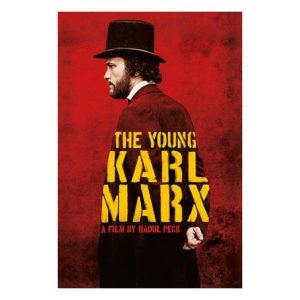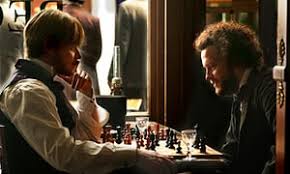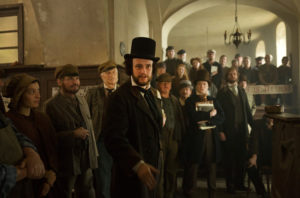
 (4 / 5)
(4 / 5)
This year marks the the bicentennial anniversary of the birth of Karl Mark, and to mark it, Haitian director Raoul Peck has made a film to commemorate this auspicious event.
When many of us think of Marx, (and I count myself among them), we have some abstract idea of a granite type entity, largely due to his tomb at Highgate Cemetery or his enormous and unfinished Magnus Opus, “Das Kapital”. Unfinished because Marx believed that the subject matter was in a permanent state of evolution. This film introduces us to the human side of Marx.
We are introduced to Marx’s family – his wife Jenny von Westphalen, (Vicky Krieps), who came from an aristocratic Prussian family, and gave everything up to be with Marx and support his political and philosophical agendas.
In contrast, Friedrich Engels was the son of a wealthy Manchester textile manufacturer, and witnessed the hardships of the workers at first hand. which he wrote about in “The Condition of the Working Class in England” (1845), a work that Marx greatly admired. Engels had a lifelong romantic relationship with Mary Burns, ( Hannah Steele), of which little is known, other than she probably introduced Engels to inside information about the suffering of the working class on which he wrote about.
The two couples juxtaposed represent a kind of counterbalance when you take into consideration their backgrounds. Marx and his family live in poverty, finding it difficult to stay in one country for a length of time due to his radical political ideas.
There is,unavoidably, quite a lot of political and philosophical dialogue in this film. The stunning opening scene which shows a group of peasants, anxiously gathering up dead wood from the forest ground, before being the recipients of a baton charged hussars patrol, leads to a voiceover on Marx’s ideas about class struggles. “To gather green wood, one must rip it violently from the living tree. Yet gathering dead wood removes nothing from the property. Only what is already separated is removed from the property. Despite this essential difference, you call both acts theft and punish them as such. Montesquieu names two kinds of corruption: One when the people do not observe the laws. The other when the laws corrupt them. You have erased the difference between theft and gathering. But you are wrong to believe it is in your interest. The people see the punishment, but not the crime. And, as they do not see a crime…when they are punished, you should fear them, for they will take revenge.”
Marx fiery personality shows him to be an inspiring orator but intellectual bully and in contrast to the more gentler Wilhelm Weitling, the tailor/political activist who as ultimately edged out of The League of the Just, the political Utopian organisation that reorganised into the Communist League under Marx and Emngel’s influence.
In a way, the film is a buddy movie between Marx and Engels. It shows that Marx couldn’t have advanced into the powerhouse he is today without Engel’s assistance – especially his financial help.
The period covered is relatively small, from 1843 to 1848, when Marx and Engels published what is believed by many to be the most influential literary work of the nineteenth century – “The Communist Manifesto”. It’s immortal first line, ” A spectre is haunting Europe — the spectre of communism. All the powers of old Europe have entered into a holy alliance to exorcise this spectre: Pope and Tsar, Metternich and Guizot, French Radicals and German police-spies”.
Karl Marx is vividly brought to life by German actor, August Diehl and his countryman Stefan Konarske portrays Engels as a quieter, more sensitive but equally determined brother in arms. Good support is provided by Luxembourg actress Vicky Krieps as Jenny and British actress Hannah Steele as Mary.
Director Raoul Peck, working with a pan-European cast and crew, manages to make the film look more lavish than it should do, and the sincerity of the work is unquestionable. You can’t help to be inspired by the energy and commitment shown by these young radicals of a century and a half ago, and it made me wonder whether we will see their like again in the future. Everything today seems so anodyne and people are afraid to speak their minds either due to retribution or fear of political correctness. So nothing much changes and the beneficiaries of this maintenance of the status quo is the bourgeoisie that should remind us that the class struggle is still present and as vital now as it was during Marx and Engels time.
“The Young Karl Marx” is an earnest didactic film, that has enough human interest within it to make it accessible and enjoyable to many cinema-goers.
I shall finish off by quoting Wilhelm Weitling in a line taken directly from the film. “Critique devours everything that exists. And when nothing is left, it devours itself”. On that note, I had better end.
Country: France, Germany Gelgium
Language: German, French, English with English subtitles where needed.
Duration: 118 minutes
It plays at Chapter in Cardiff until 5th July.
https://www.chapter.org/young-karl-marx-ctba
Roger Barrington


